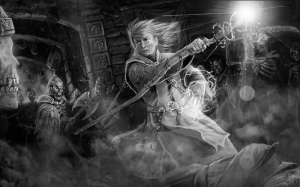 As the old saying (which I just made up) goes – anyone can play a Wizard, but it takes a certain kind of person to play a Wizard well.
As the old saying (which I just made up) goes – anyone can play a Wizard, but it takes a certain kind of person to play a Wizard well.
Of course, the same might be said about any class, but this post isn’t about the other guys. We’ll save those for another time.
The Wizard class does, however, differ from the other mainstream classes in its sheer out-of-gametime tinkerability. Even when you’re not sitting at the table (real or virtual), the Wizard player can be inventing new spells or pouring over published books looking for the perfect Cantrip or Evocation for their spell-caster. I doubt many Fighter players will spend much time inventing new melee weapons, or Rogues new types of lockpick (I’ll grant you, there are probably a few out there raising your hand right now), but the Wizard is the premier class when it comes to giving players the tools to make permanent and long-lasting changes to the game world.
I remember a Wizard player in one of my campaigns inventing Jellob’s Bouncing Fireball, and we still use it to this day. The spell has been revised (not to mention nerfed) over time and across editions, but the memory of that caster and his legacy lives on through the ages. What other class can do that? Fighters might be able to build their castles and Clerics their temples, but they will eventually be nothing but dust and the knowledge of that spell will live on.
It’s easy to think that the defining characteristic of the Wizard class is their spells and that’s largely true, though far from the whole story. The true defining characteristic of a well-played Wizard is a different thing entirely.
It’s preparation.
The Wizard is (usually) the smartest character in the party. They let fools (and Barbarians) rush in while they plan, prepare and make sure they know their enemy in advance. A wise Wizard player says they are going to research the history of the dungeon before entering it, and knows the threats and monsters they are likely to encounter once they are inside. If short on time or lacking vital information, they will suggest that the Rogue and Ranger scout ahead and the Cleric cast whatever Divination spells they have available. To a Wizard, knowledge is their plate armour and shield. Only when they have the preparation done and knowledge gained do they crack open their spell books and memorize just the right spells for the quest.
The same preparation extends to the first round of an encounter as well. Unless they have exactly the right spell to shape the battlefield to the benefit of the rest of the party, the worst place for the Wizard to be is at the top of the initiative list. Let the fools (and Barbarians, and Fighters, and…..) rush in so that you can discern which enemies to target and which ones the rest of your party can handle. If that means delaying your action until later in the round so you can size up your foes, so be it. You may well earn a name for allowing your fellow heroes to take the blows they could have otherwise avoided, but it’s a small price to pay for being able to end the encounter sooner. Wizards do have a reputation for aloofness, after all.
In summary, the Wizard is far more than a walking Magic Missile launcher. It is the class which plans and prepares. It is the class that can create new and game-changing spells and (once they forgive you) is everyone else’s best friend. If you want to play him well (and I hope you do), don’t just pick the highest damage spells in the list and never adapt to situations.
Be prepared, and kick ass. Because you’re the Wizard.
Till next time!
- This article originally posted at The Gamer Effect on April 17th, 2013.
- Image by Hokunin. Used with permission.

The wiley wandering wizard is an interesting character. As you may sense there is a But coming.
But, how many game systems give instructions that the things you mentioned can be done. learn your spells for the day, not learn the history of locations and then learn the right spell. Wizards feel restricted at early levels so this is why a player picks Magic Missile or even pivking fighter in stead. Wizards need to appeal to more then more will play them. Although generally I myself would not play a wizard they are vulnerable and weak. this is why wizards are great evildoers. they learn their spells and gain their powers and then they realise that following isn’t fir them. Ruling over others. That’s what makes a Great wizard.
True. I wish RPGs did more to cover how to play all of the classes as a whole, not just the Wizard. Every class plays differently, and that calls for different tactics and style of play. There should be plenty to wiggle room too (so if you just want to play a blasty Wizard who uses the same spells all the time that’s cool too), but we would benefit from some guidelines that say “you might want to play this class if………..”.
Thanks for the comment 🙂